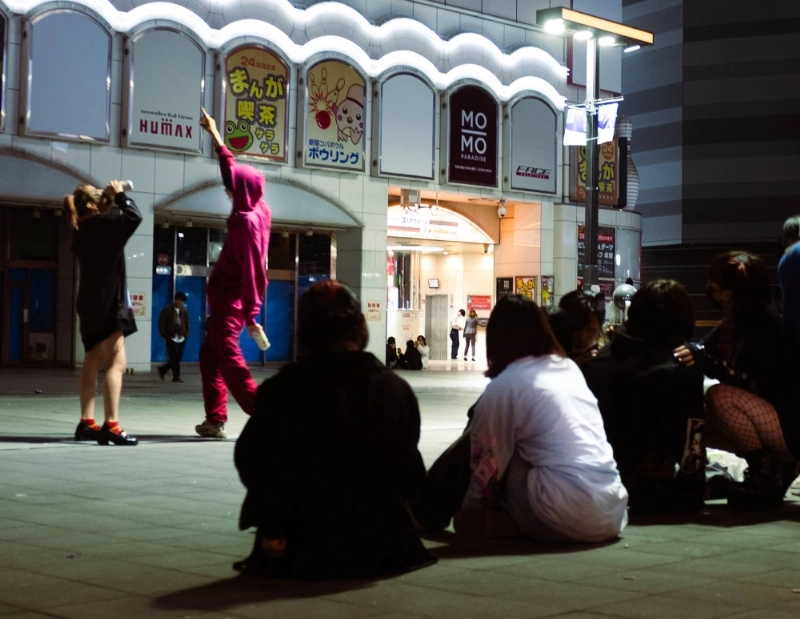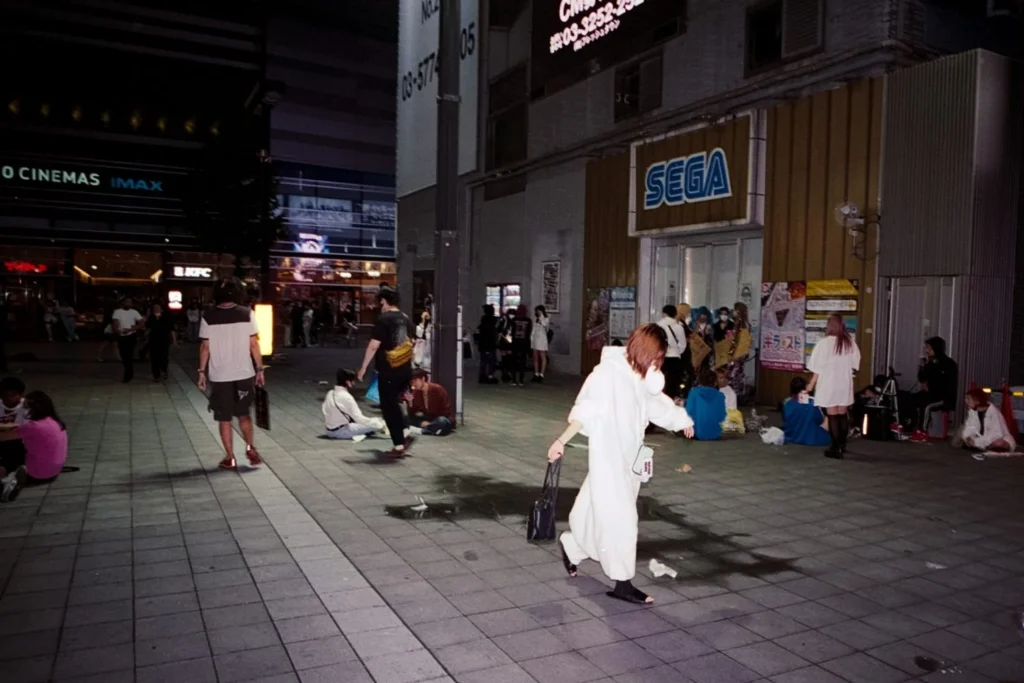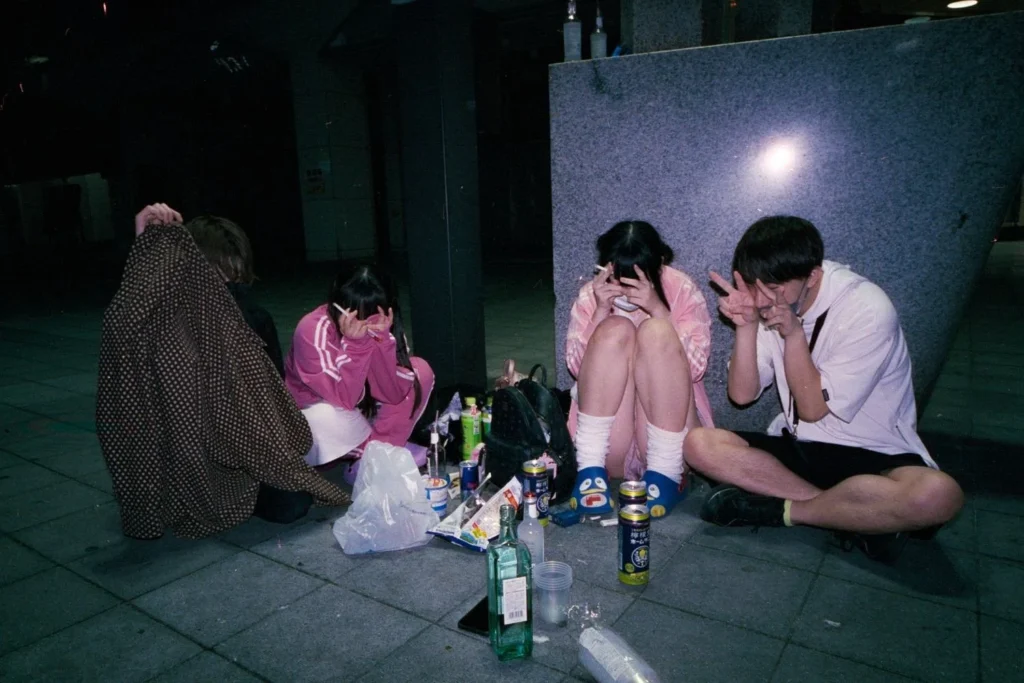(Editor’s Note: All names in this story have been changed. Writer Chaz Plager grew up in Pacific Palisades and lost his family home during the fire. He taught himself Japanese during Covid and is fluent. This August he is in Japan on assignment and will start his sophomore year this fall at UC San Diego.)
By CHAZ PLAGER
As much as I love the Palisades, and Santa Monica as a whole, there is a problem that has persisted for years, despite the best efforts of our community and our government: the homeless.
Although many think of Japan as a country close to utopic, with amazing infrastructure, social security, and polite citizenry, there are a group of homeless the “Toyo Kids,” who are not often written about.
On an August summer night, I wandered into a Tokyo public park known colloquially as “Tohyoko,” a pun on “Toyoko”– a word meaning the “Toyo Kids.” In that public park, which was little more than a flat slab of concrete about sixty feet long and fifty feet wide, a large gathering of Japanese kids in flashy outfits were crowded inside an area fenced with blue plastic– and, more curiously, the blue fences were crowded with people of all nationalities and ages, simply watching.
I leaned on the fence next to a kid who seemed to be about my age and casually asked, “What’re you guys looking at?” Turning around and realizing I was a foreigner, he fumbled with his English for a moment. “It is, ah, Japanese human zoo.” I was taken aback. “Human zoo?” I responded in Japanese. “What does that mean?”
“Oh, so you speak Japanese,” he said, laughing. “That makes things easier. Do you know who the Toyo Kids are?”
As he explained it, the Toyo Kids are a general term referring to the kids who run away from home, or have no home to go back to, and wind up in the red-light district of Kabukicho, Tokyo, taking on dirty or low-paying work to make it through each day.
It is around this gathering spot of Tohyoko that curious onlookers of all kinds gather, hence the second colloquial term of “human zoo.” He and his friend introduced themselves as Sotaro and Ken respectively, both high schoolers from Hokkaido vacationing in Tokyo on summer break.
“We had heard the legends, and these kids are about the same age as us, so we wanted to go and see what it was all about,” said Sotaro. “We’d like to talk with them, too, but it’s a little difficult to approach them. It looks like something straight out of hell in there.”
At that moment, a shirtless man in his twenties approached the fence where we were standing. “What the fuck are you looking at?” he shouted at no one in particular, spilling his beer. “You think this is a show? Huh? I’m the king of this park. You got questions, you ask me! Yeah!” He then proceeded to dash towards a nearby fence and perform a remarkably clean front flip over it.
I turned back to Sotaro. “I see what you mean.”
“Where did you come from?” Ken asked me. He was a bit taller than Sotaro and noticeably less muscular, but wore a flashy outfit similar in style to what the Toyo Kids were wearing.
“California,” I answered.
“Yo, hold on,” came a voice from inside the fences. I looked up to find two of the Toyo Kids had walked up to us. One was a tall, thin girl, Yukko, with cropped black and white hair and plenty of piercings; the other was a short boy, Yosuke, with long arms and a tight smile. The girl was looking directly at me. “You’re from California? I grew up in San Jose. I only moved to Japan when I was seven.”
I was surprised. “Yeah, I am. Have you ever been to Los Angeles? That’s where I’m from.”
“No, my dad was working all the time, and my mom wouldn’t go anywhere on her own,” she said. “I’m Yuuko, by the way.”
“Y’know, despite going to school in America, Yuuko is actually really stupid, so don’t get your hopes up,” Yosuke said. “Not every day I see an American talking to the Toyo Kids.”
Yuuko rolled her eyes. “Shut up, dude.” A boy with purple hair sidled up next to her and began chattering away about something. While those two talked, Sotaro, Ken, and I turned to Yosuke. “Are both of you, uh…” Ken didn’t finish his sentence, but Yosuke picked up what he was saying. “No. Well, she’s a Toyo Kid. I’m not. I’m just… in similar circumstances, so we became friends. I work as a DJ and postboy part-time, so I make enough to afford my own apartment.”
“Similar circumstances?” I asked.
Yosuke snickered and silently jerked a thumb at Yuuko’s arms. I saw her arms and legs were completely covered in cuts and bruises. “That’s what I mean. She was living with her family until recently, but she hit her limit and had to run away.”
The purple haired boy finally left. “Do you know that guy?” Ken asked Yuuko. “Not at all,” she replied.
“You’re lucky we came and talked to you first,” Yosuke said, deftly changing the subject. “Most Toyo Kids aren’t gonna talk to you if you aren’t dressed like them or look like you don’t have money. And if you come and talk to them, it’s usually for one of three reasons: you want to know what they’re doing, you want to talk to them, or you want to have sex with them. Which one are you guys?”
“I was just passing by,” I said hastily. Sotaro and Ken waved their hands. “We were both just looking.”
“Really? Shame. I’m sure Yuuko would appreciate a place to stay for the night… Of course, she’s willing to put out in return,” laughed Yosuke.
“Kill yourself,” mumbled Yuuko.
Sotaro coughed awkwardly. “How about we go to that arcade over there? We could get out of the heat, maybe play some rhythm games…”
“Rhythm games?” Yuuko perked up. “Do you play MaiMai?”
“Hell yes! I’ve been playing for the last four years. Not much else to do over in Hokkaido.”
“Let’s run it,” said Yuuko. “I’m pretty confident in my skills.”
As we were leaving, I glanced back at the park to see police gathered in a corner, handcuffing a sniffling girl dressed in bright pink. A man in a gray suit was being sternly talked down to by an officer. I couldn’t begin to guess what was going on there, and I didn’t want to ask.
Yuuko proceeded to utterly obliterate Sotaro at the rhythm game. “How the hell did you get so good at this?” panted Sotaro. “You’ve been doing this half as long as I have!”
Yuuko shrugged. “Maybe, but I was doing it every night until the arcades closed to avoid going home. And since I left for good, I’ve had a lot more free time to kill.”
“How old are you?” I asked.
“Twenty. I was in college until recently. I dropped out.”
“One more time!” exclaimed Sotaro.
Ken laughed. “I’ll go play another game while you get whupped again.” Yosuke and I were left standing behind Sotaro and Yuuko, watching them silently battle it out.
“It makes me feel kind of bad,” I said. “Hearing all this and not being able to help.”
“Yuuko doesn’t need your help,” said Yosuke. “She doesn’t want it, either. None of the Toyo Kids do. They don’t have it so bad.”
“Don’t have it so bad?” I said incredulously. “They’re sleeping on the street!”
“Yeah, the thing about that is Japanese people hate things that take effort,” said Yosuke. “You can sleep on the street with your bag out and no one will take it. People just leave each other alone. But on the flip side, I’ve seen people start frothing at the mouth and fall over and no one will come to help them. Because the Japanese hate things that take effort. Generally, though, it could be worse.”
“How can it be worse?”
“I used to be in the Doya-machi encampment in Osaka,” Yosuke explained. “Everyone was like forty or fifty years old, and the cops were always ready to grab you over any little thing. Here, everyone is a lot less meddlesome. Even the cops. They only yell at you to get out when they clean the streets at like 6 a.m. And the shops will let you clean the floors for a meal or maybe give you a snack for free. Everyone finds a way to make it through the day.”
He pointed at Yuuko. “See, Yuuko became one of the Toyo kids maybe a month ago. Ran away from home when she just couldn’t take it anymore. And everyone welcomed her in. Stood by her. And that’s what makes the Toyo Kids a gray zone. Because it exists, young kids end up doing all kinds of dirty, underpaid, sometimes illegal work just to make it through the day. And they’re definitely a bad influence on some kids. But as long as it exists, they’ve got a support group in each other. And being able to live alongside people who know what you’re going through can be all you need sometimes.”
Later that day, I would meet another Toyo Kid named Kazusa. We bonded over a shared anime interest, and I followed her on Instagram. That night, she would post a message from a man telling her to kill herself. “I’m going to do it, and it’s your fault”, she wrote on her public story.
She would not post anything until 18 hours later, when she posted a photo of her and another Toyo Kid. “Thank you so much for being there for me,” she wrote under the photo.
Back at the arcade, I silently looked down at the floor, unable to find the words to respond to Yosuke’s story. He clapped me on the back. “Hey, don’t feel bad,” he said. “You’ve still got a human heart. Not like me. I know Yuuko and all these other kids are struggling, and I just make jokes at their expense the whole time.”
“I don’t know about that. I think you’re just trying to distract yourself from how bad things are with jokes,” I said. Yosuke didn’t respond to that.
As we exited the arcade, we saw a large man with a beer in each hand rowdily chatting away with the Toyo Kids surrounding him. “Mr. Hazuki!” Ken said breathlessly. “He’s really here!”
I asked who he was. “We’ve been trying for three days to meet him,” explained Sotaro. “In every video you see of the Toyo Kids, he’s usually nearby. He does right by them.” To many, he’s an adult they feel they can trust. Sotaro and Ken waded their way through the crowd to give their greetings to Mr. Hazuki, who replied to them in a thick, booming voice I couldn’t quite make out. The two came back with smiles on their faces. “He’s so cool,” Sotaro said.
As the clock hit 10:30 p.m., the children began to disperse. Under Tokyo law, unaccompanied children past 11 p.m. are taken to the nearest police station and returned to their parents, which for many of the Toyo Kids isn’t something they can afford to happen.
“We’ll be fine,” said Yuuko. “Me and Yosuke are both twenty, so we can wander around as much as we like.”
“What’ll the kids who are underage do?” I asked. “Do they have somewhere to stay?”
“Well, some of them scrounge up enough cash to split a room in a hotel, others sleep on the street somewhere they won’t be found, and others will hope a man picks them up as a bedside companion.”
Out of the corner of my eye, I saw a security guard begin to approach us, making broad gestures to the Toyo Kids as he passed. When he arrived, he pointed at Yuuko and Ken. “You brats need to get out of here,” he said. “It’s past your curfew.”
Yuuko looked ready to argue, but eventually just sighed and shook her head. Each of us exchanged our Instagrams and said our goodbyes, but before I could leave, I motioned to the security guard that I had a question to ask.
What Yosuke had said was still stuck in my mind, and I wondered what the authorities had to say on the matter. Perhaps they could provide some sort of insight as to how they were trying to end the problem. If so, the Palisades could use that as inspiration to end our own problems.
“Excuse me sir, but if the children aren’t allowed to stay in this park, where do you think they should go?”
“I think they should bring a big garbage truck and take all of these kids to the landfill where they belong,” he replied.
And that was that.




An eyeopening article but of course we know that homelessness exists everywhere. I am 82 and I remember the “bums” who hung around the railroad tracks when I was 5. It was near my father’s office and I was not supposed to talk to the “bums” but I did. Most were alcoholics and carried chewing gum which they shared with me. Some were very young and I wondered about them at the time – where did they go to sleep at night. I knew my family was poor and having a hard time but at least we got to sleep in a bed in a room at night. It is a sad old story and one we should meet with compassion but that is so much harder in big cities and crowded places and most especially in our current mean times. Compassion and empathy are scarce enough at any time and very much more so today. I see a lot of that Security guard’s attitude. Too bad.